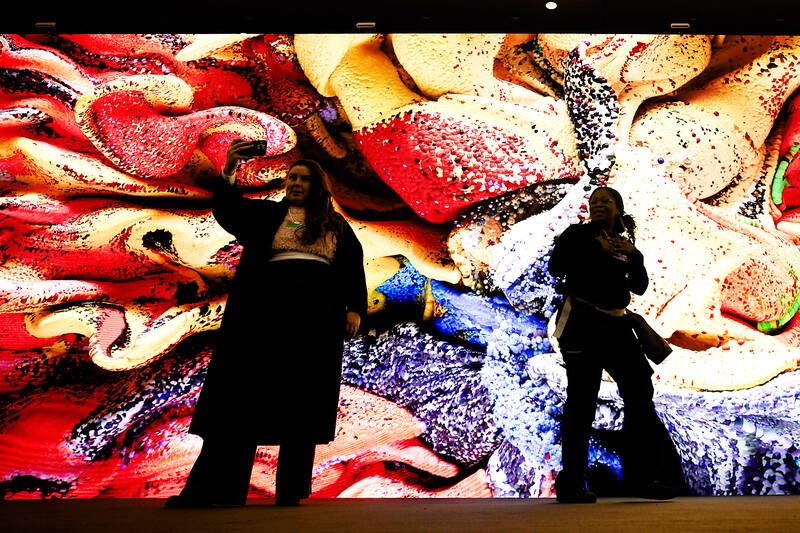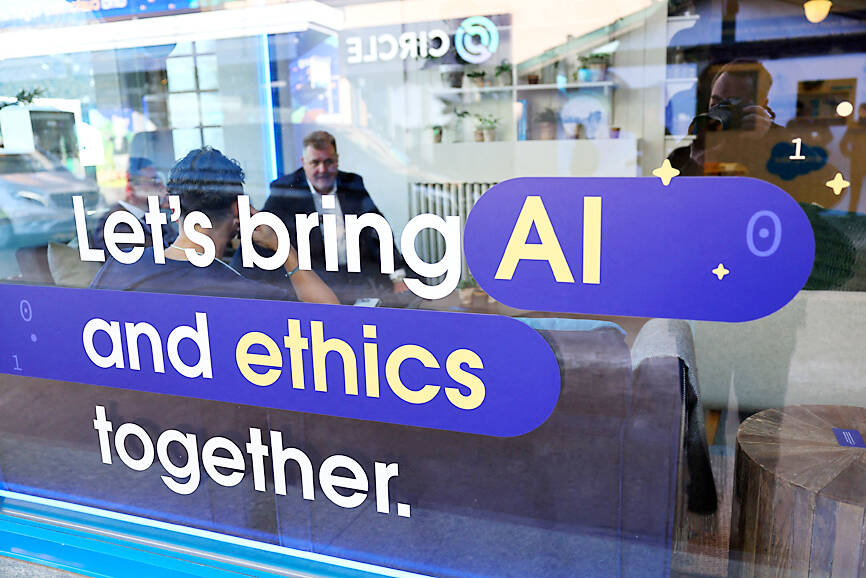A TikTok tarot card reader gazes at me through the screen and draws a card.
“If you’re seeing this,” she coos, “it was meant for you.” And in a sense, she’s right. But it wasn’t fate that brought me here, it was an algorithm.
Spirituality and mysticism have long found a home online, but the rise of generative AI and personalized content recommender systems are making it easier than ever to project a sense of magic upon technology.

Photo: AP
As the Arthur C Clarke quote goes: “Any sufficiently advanced technology is indistinguishable from magic.”
Anyone who has been served content that feels eerily perfect for them might have wondered at the mysterious omnipotence of The Algorithm. And while there’s nothing inherently wrong with experiencing a sense of wonder in the face of technological advancement, or even using digital technologies to enhance a spiritual practice, collapsing magic and technology can be risky.
‘ASK THE STARS’

Photo: Reuters
Off the back of OpenAI’s large language model GPT-4, many religious and spiritual spinoff chatbots have emerged. You can get BibleGPT to write personalized Christian poetry, use Jesus AI to, as the website claims, have “meaningful conversations with Jesus Christ” and chat with WitchGPT about paganism.
“Welcome to the void” beckons the popular astrology app CoStar in its own latest chatbot feature, encouraging users to seek generated guidance for a fee of about US$1 per question. Choosing from a list of suggested prompts, I “Ask the Stars” if I have a secret admirer. “No,” it tells me (rude).
In true CoStar fashion (the app is famously sassy) it also rebukes me for having asked the question at all, suggesting I should instead find gratitude in what I already have.
These examples are at best a bit silly and probably harmless. At worst, they reveal grifters out to make a buck by manufacturing a sense of insight or enlightenment by leveraging the human tendency to anthropomorphize technology or by gaming social media engagement algorithms.
But among the chaff there are also people forming genuine spiritual communities and engaging in witchcraft and other sacred traditions online. As with many subcultures, social media can be both a blessing and a curse: it can enable otherwise disparate groups to connect, but can also lead to the diminishment or adulteration of cultural practices.
Feminist anthropologist Emma Quilty, who has forthcoming books on magic and technology, makes a distinction between those that focus on the collective and those that push a “neoliberal spirituality” which aligns itself with hyper-individualistic ideas of self-improvement.
This edges uncomfortably close to commercialized forms of self-care, utterly divorced from its Black radical feminist roots and redirected towards a capitalist cooption of wellness. Quilty highlights how trends fueled by social media can also result in practices becoming detached from the (usually eastern) religious traditions and cultures they are imported from, and in some cases lead to unsustainable market demand for products such as crystals and white sage smudge sticks.
None of this is to say that it’s impossible to develop meaningful spiritual communities and practices online nor that it’s impossible to have a profound experience using digital tools.
I’m not interested in dismissing where and how people derive meaning. Yet it’s important to remember that technologies including large language models and personalized recommender systems are ultimately designed to generate value from their users.
Any profound experience from these tools comes from us — the humans — not the tool. As Quilty notes: “Something can be positive, helpful or even empowering on an individual level, but can still be harmful at a broader societal level, because of the underlying interests and imperatives of those building and implementing the technology.”
MAGIC AND TECH
Indeed we can get into treacherous waters pretty quickly when we misattribute magic to technology. It plays right into the hands of companies that would rather us be awestruck by a shiny user interface and smooth convenience and not peep behind the curtain to reveal a crotchety old man holding things together with overblown marketing language and regular old profit-driven data extraction.
When magical thinking about technology spreads to the level of policymaking, it can become dangerous. Too often governments and companies alike are quick to turn to technology as a silver-bullet solution to complex social problems. And when the real limitations and consequences of technologies are ignored — such as how automation can exacerbate social inequalities, or how
ChatGPT couldn’t function without stealing copyrighted material, or that automated content moderation relies on exploited invisible workers — we end up with policy that fails to rein in the worst of tech’s ails and relegates the more complex but necessary policy interventions to the background, all overshadowed by the magical allure of technology.
Technology isn’t a cure-all for social ills, and can, when misused for personal gain, cause great harm — just like magic.

Last week, the the National Immigration Agency (NIA) told the legislature that more than 10,000 naturalized Taiwanese citizens from the People’s Republic of China (PRC) risked having their citizenship revoked if they failed to provide proof that they had renounced their Chinese household registration within the next three months. Renunciation is required under the Act Governing Relations Between the People of the Taiwan Area and the Mainland Area (臺灣地區與大陸地區人民關係條例), as amended in 2004, though it was only a legal requirement after 2000. Prior to that, it had been only an administrative requirement since the Nationality Act (國籍法) was established in

Three big changes have transformed the landscape of Taiwan’s local patronage factions: Increasing Democratic Progressive Party (DPP) involvement, rising new factions and the Chinese Nationalist Party’s (KMT) significantly weakened control. GREEN FACTIONS It is said that “south of the Zhuoshui River (濁水溪), there is no blue-green divide,” meaning that from Yunlin County south there is no difference between KMT and DPP politicians. This is not always true, but there is more than a grain of truth to it. Traditionally, DPP factions are viewed as national entities, with their primary function to secure plum positions in the party and government. This is not unusual

The other day, a friend decided to playfully name our individual roles within the group: planner, emotional support, and so on. I was the fault-finder — or, as she put it, “the grumpy teenager” — who points out problems, but doesn’t suggest alternatives. She was only kidding around, but she struck at an insecurity I have: that I’m unacceptably, intolerably negative. My first instinct is to stress-test ideas for potential flaws. This critical tendency serves me well professionally, and feels true to who I am. If I don’t enjoy a film, for example, I don’t swallow my opinion. But I sometimes worry

US President Donald Trump’s bid to take back control of the Panama Canal has put his counterpart Jose Raul Mulino in a difficult position and revived fears in the Central American country that US military bases will return. After Trump vowed to reclaim the interoceanic waterway from Chinese influence, US Defense Secretary Pete Hegseth signed an agreement with the Mulino administration last week for the US to deploy troops in areas adjacent to the canal. For more than two decades, after handing over control of the strategically vital waterway to Panama in 1999 and dismantling the bases that protected it, Washington has